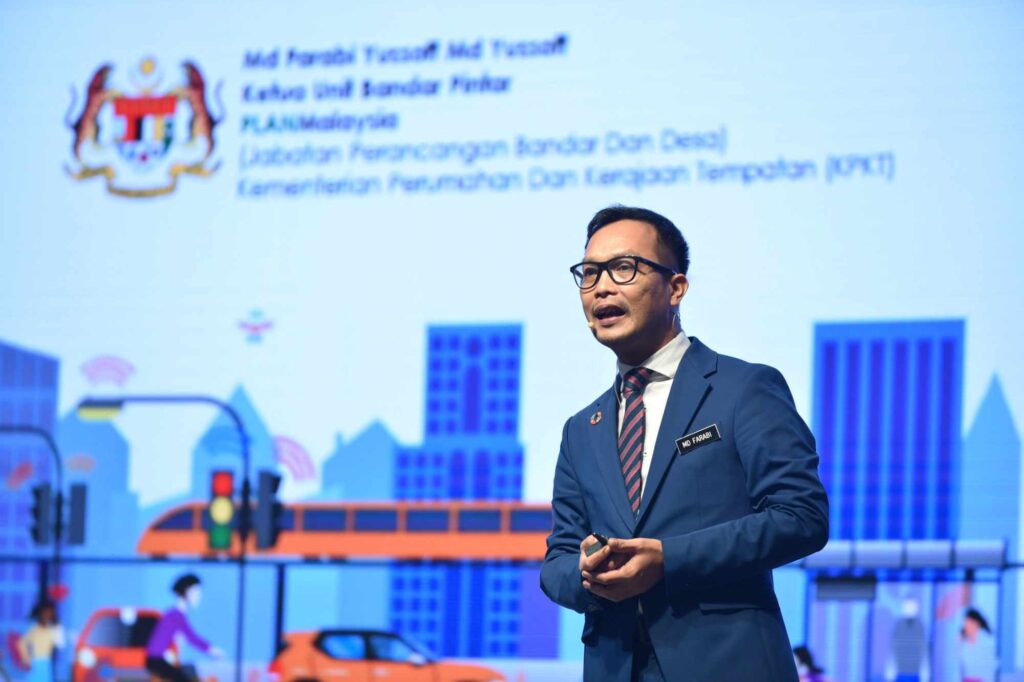

Md Farabi Yusoff, Head of Smart City from PLANMalaysia delivered his presentation at TM One’s City Leap Summit 2002. This article summarizes the key takeaways from his address.
“Smartness” is not a measure of how advanced or complex the technology being adopted is, but how well the solutions solve the society’s problems and address existential challenges”
– YB Datuk Seri Reezal Merican bin Naina Merican, Minister of Housing & Local Government
Smart City has been a hot topic of discussion for the past decade. With the advent of IR 4.0, the technology underpinning smart cities has matured significantly. Over the years, the Pihak Berkuasa Tempatan (PBT)’s understanding of the potential benefits to be reaped through the implementation of smart cities has also evolved. The next big challenge is in making the implementation of smart cities successful. There are two key imperatives in making this possible, viz., (a) developing a holistic smart city plan and (b) a blueprint for turning fundamental concepts into action.
Smart cities cannot be developed in silos – it requires a network of connected solutions that are effectively integrated, with data feeding into each element to ensure all facets of city-dwelling are elevated to the same level of capability and efficiency. An effective smart city is both holistic in nature and all-encompassing. The network of connected solutions also needs to be functional, providing tangible solutions to actual issues faced by citizens.
Even at a conceptual level, holisticness and people-centricity need to be embedded into smart city development to guide decision-making and ensure the solutions chosen are people-oriented and realistic. For this to happen, smart cities require careful planning and development, with each decision accounting for infrastructure, city operations and digital capabilities to create the solutions capable of elevating all elements of city-dwelling.
PBTs should prioritise taking this holistic approach into the conceptual framework of smart cities:
While a holistic, all-encompassing conceptual framework underpins smart cities’ strategic development, implementing the said framework presents an entirely different challenge. Concrete action plans based on a flexible, adaptable blueprint is the surest way forward in making smart city initiatives a success.
In creating an adaptable blueprint, PBTs need to ensure that all the 4 fundamentals of smart city planning are covered. While the overall action plan can be carried out incrementally through stages, each stage needs rigorous review. Subsequent actions need to be adapted to fit needs of citizens and PBTs accordingly as new findings arise across the journey. The blueprint can broadly be classified into three distinct phases.

As the Federal Department of town and country planning for Peninsular Malaysia, PLANMalaysia’s role in the smart city agenda is to guide and support local councils in realising their smart city aspirations. Our work encompasses the four areas which are detailed below.
Creating Smart City blueprints: Effective smart city planning and implementation cannot be one-off decisions. Each element needs to feed into one another to create a network of systems and solutions. With that, PBTs need a blueprint that strikes a balance in being both definitive and flexible, and to assist decision-making when it comes to choosing solutions and deciding ways forward – this is where PLANMalaysia comes in, to guide PBTs on blueprint formation and ensure decisions made are holistic and adaptable to future needs.
Running Malaysia Urban Observatory (MUO): Data collection and interpretation are integral to smart cities. MUO is a data-sharing platform that enables public data sharing and supports decision-making. PLANMalaysia’s custody of MUO ensures that all local councils can benefit from the federal department’s collaboration and support, effectively interpreting public data in enhancing services tied to smart city systems.
SmartCity Accreditations: Involved in the makings of the standards or benchmarks for smart cities and data integration. To ensure usability of data and effectiveness of smart city implementation, certain criteria needs to be met to ensure systems chosen are in fact beneficial, functional and can be used to generate the right insights to enhance public services.
Increasing Awareness: One of the vital challenges to smart city implementation is stakeholder management, and there are many. PLANMalaysia endeavours to manage vital stakeholders by running several campaigns and programs to align all relevant stakeholders, from investors to local authorities to local communities. This fuels understanding of the ultimate goal of transforming into a smart city and the benefits that stand to be gained by all stakeholders.
When addressing smart cities in the past, we may have been uncertain of what was needed. We may have not fully grasped the technology or were not aware of what we wanted out of it. Today, we are in a much more secure position – enriched by knowledge, alongside the maturation of the technology, we are more ready than ever to be elevated towards a smarter future. The road ahead may not be simple or straightforward, but we are equipped with guides, blueprints and action plans which are both symbols and roadmaps to success. They represent our common goals is our binding objective in uniting all stakeholders towards a smarter, healthier, more sustainable Malaysia.